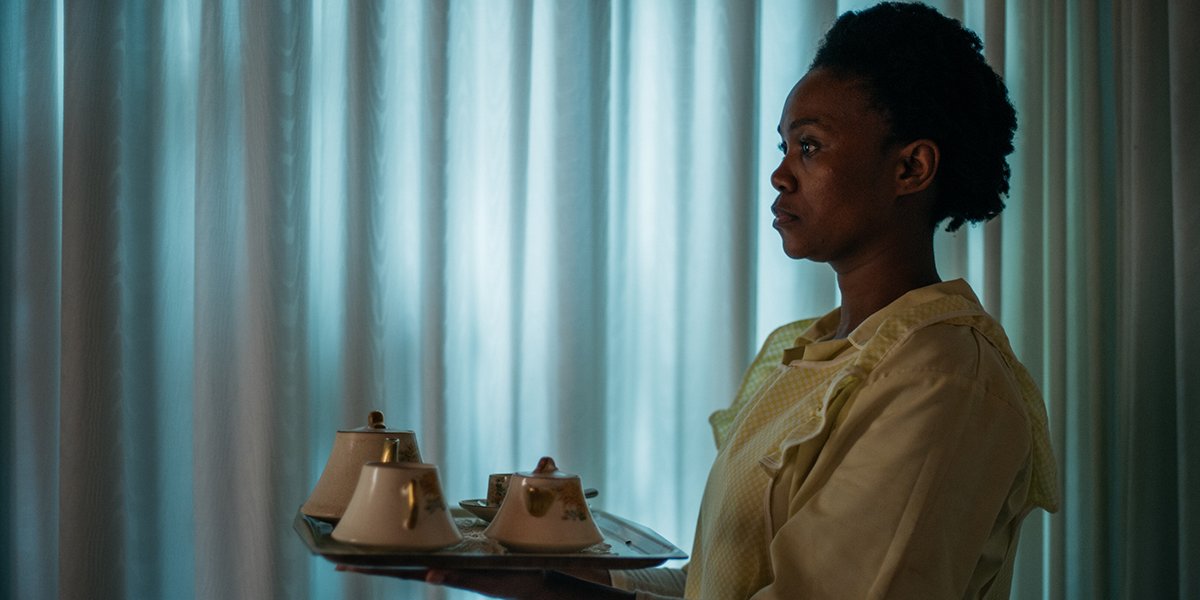Good Madam
Directed by Jenna Cato Bass
Running time: 1hr32 | REVIEWED BY GUY LODGE
Chumisa Cosa in Good Madam
Growing up in predominantly middle-class suburbia in the restless South Africa of the ‘80s and ‘90s, the idea of white households — not even unusually wealthy ones, notwithstanding their vast social privilege — having black live-in servants was quite joltingly normal. Even many nice, notionally liberal families didn’t reject the tradition, instead making sure to stress how kindly and inclusively they treated their domestic workers. “She’s part of the family” was an oft-heard line, though you’d only need to glance at the house’s poky servants’ quarters, or consider the worker’s own kin — their children often dispatched to be raised by rural relatives — to see through that sentiment.
This deep-rooted culture of exploitation and hypocrisy — and its lingering legacy in a changed but still unequal post-apartheid South Africa — is the raw nerve on which Jenna Cato Bass’s spare, searing horror film Good Madam is built. It’s a chamber piece of sorts, almost all its action contained in the large, plush but faintly funereal Cape Town house owned by Diane, the scarcely-seen madam of the title. Single and elderly and confined to her bed, Diane nonetheless exerts a petrified air of control over its various yellowed rooms, immaculately kept by her longtime housekeeper Mavis (Nosipho Metebe) — herself getting a little old for a daily grind of scrubbing, dusting, polishing and waxing.
Mavis regards her employer with a barbed loyalty: “She is my burden,” she explains to her more openly resentful adult daughter Tsidi (Chumisa Cosa) when the latter turns up unannounced to crash in her mother’s quarters, complaining of the “apartheid” being maintained in this well-to-do home. Indeed, to keep the roof over her head, she must keep her oppressor alive and well — a cycle of servitude and dependency also held in place by eerier, more uncanny forces, as the house reveals its own ways to enact madam’s will.
A young filmmaker already known for merging and modernising genres to fit a new national landscape — working here with a large, diverse team of co-writers that includes her excellent acting ensemble — Bass deftly mixes old-school haunted-house tropes with a subtler, more corrosive strain of political allegory. Good Madam is frightening in many of the places you expect, but then lingers in places you don’t: it’s not only South Africans who will watch this and interrogate their own relationship to service, and to the colonialist structures keeping certain social hierarchies in place. It’s tempting to draw comparisons here to the caustic horror-satire of Jordan Peele’s Get Out, or the dizzying domestic reversals of Bong Joon-ho’s Parasite. Yet Good Madam has its own distinctive point of view — one that cleverly renders the ruling class mostly invisible, but viscerally felt through their spaces, their possessions, their swimming pools and security alarms, all kept in good order by those who benefit least from their comforts.
GOOD MADAM (2021) Written by Babalwa Baartman, Jenna Cato Bass, Chumisa Cosa, Nosipho Mtebe, Kamvalethu Jonas Raziya, Sanda Shandu, Khanyiso Kenqa, Chris Gxalaba, Peggy Tunyiswa, Sizwe Ginger Lubengu, Siya Sikawuti and Steve Larter | Shot by Jenna Cato Bass | Edited by Jacques de Villiers
